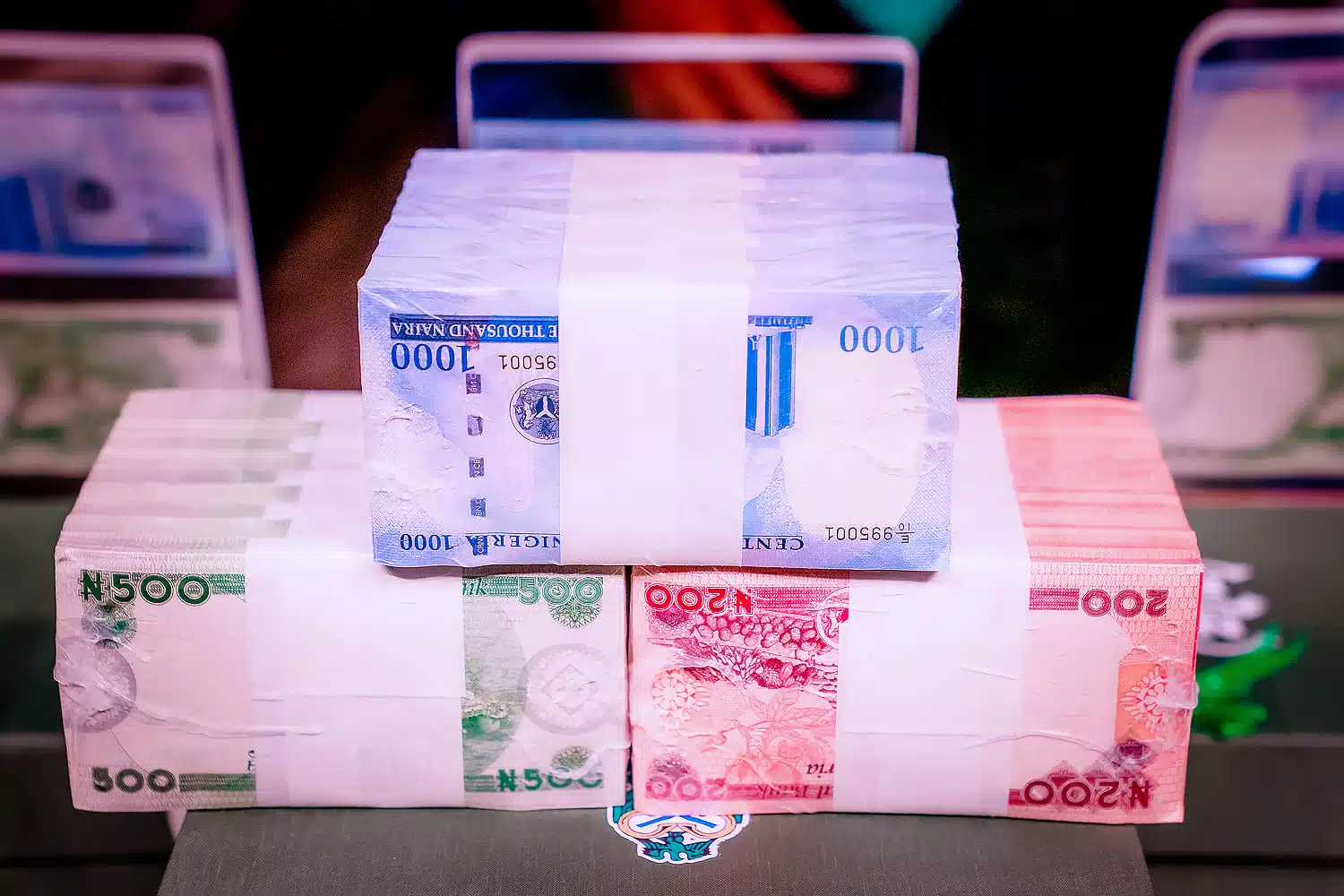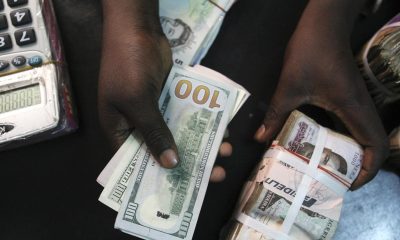Nigeria News
Naira Gain Against Dollar: A Sign Of Nigeria’s Economic Recovery?

The Nigerian Naira has shown some positive signs lately, with a trend of appreciation against major currencies like the US Dollar.
This development has sparked debate amongst economists and Nigerians alike. The big question is, is this a sign of a recovering Nigerian economy? Before conclusion, let us examine some factors contributing to the Naira’s rise, which include oil price, CBN intervention and diaspora remittance, among others. Naija News reports that Nigeria’s economy relies heavily on oil exports. With the recent surge in global oil prices due to geopolitical tensions, Nigeria’s export earnings have risen, strengthening the Naira’s value.
The Central Bank of Nigeria (CBN) has taken steps to address currency speculation and enhance foreign exchange accessibility. These measures have played a role in stabilizing the foreign exchange market. Additionally, analysts have recognized that remittances from Nigerians living abroad continue to serve as a reliable source of foreign exchange for the country. These inflows can potentially contribute to strengthening the value of the Naira.
However, despite the positive progress in the Naira’s value, it is crucial to exercise caution when proclaiming a complete economic recovery. Nigeria still confronts substantial obstacles such as:
High Inflation – Inflation rates remain stubbornly high, eroding the purchasing power of many Nigerians. A strong Naira is positive, but it needs to be accompanied by falling prices for essential goods.
Security Concerns – The ongoing security issues in some parts of the country continue to dampen investor confidence and hinder economic growth.
Structural Issues – Deeper structural issues like dependence on oil exports and a large informal sector need to be addressed for sustainable economic recovery.
A Need For Continued Focus
The positive trajectory of the Naira provides a glimmer of hope for the Nigerian economy. However, it is imperative to focus on:
Economic Diversification – It is crucial to reduce dependence on oil by promoting sectors such as manufacturing and agriculture to ensure long-term economic stability.
Inflation Control – The government should prioritize policies to lower inflation rates and enhance Nigerians’ living standards.
Security Measures – Establishing a secure environment is essential for attracting investments and fostering economic growth.
Naija News acknowledged that the appreciation of the Naira is a step in the right direction, but it is only a part of the solution. Achieving sustained economic recovery will necessitate a comprehensive approach that tackles Nigeria’s fundamental challenges.
Price Of Commodities Still Worrisome
It is important to highlight that despite the recent increase in value of the Naira, the Nigerian commodity market is still undergoing significant fluctuations. The local currency has been going through a period of instability, resulting in uncertainty and affecting prices across various goods. This has put a strain on consumers, as essential commodities such as food items and household goods become more expensive. Importers, who heavily rely on the Naira’s strength to purchase foreign goods, are facing higher costs, which are often transferred to consumers. On the flip side, some exporters are finding a positive aspect in this situation.
Naija News understands that a weaker Naira can potentially make its products more competitive in the global market, leading to a potential increase in export sales. However, this advantage can be counterbalanced by the escalating production costs within Nigeria. The instability of the Naira has had a widespread impact on various sectors of the Nigerian economy.
Food Prices: The prices of essential food items such as rice, garri, and beans have increased in recent weeks. This can be attributed, in part, to higher import prices and the escalation of transportation costs.
Manufactured Goods: The prices of electronics, clothing, and other manufactured goods have also witnessed an upward trend. This is primarily due to the fact that many of these products are imported, and the devaluation of the Naira has made them more expensive.
Exports: While a weaker Naira could potentially benefit agricultural exports like cocoa and sesame seeds, the rising production costs within Nigeria may counteract this effect.
Has The Era Of Dollar Draught Come To An End?
When asked to speak on the recent Naira appreciation and if it is safe to conclude that the era of Dollar draught has come to an end, Nigerian financial analyst, Gbenga Onifade, responded: “Nigeria’s currency, the naira, gained 40% in the last month against the dollar, making it the world’s best currency performer. On the other hand, inflation climbed to its highest in a generation at 33.2%. This is mostly due to the acceleration of food costs, which matches the similar size of the population in abject poverty. “President Tinubu initiated new measures to tackle inefficiencies in the system, the CBN governor has equally introduced lots of new controversial policies. These, as unfriendly as they seem, have been divisive but also been one for the books. “Recent commendable gains might make us feel like one for the record books, it should still be noteworthy that oil production has been on a decline with a lot more unsold inventory. Therefore, majority of Nigerians are unable to benefit from high crude oil prices, created, mostly by global geopolitical unrests, especially across the Middle East. “We have not seen the last.”
How Long Can The CBN Policies Sustain The Naira Gain?
“The majority of the Nigerian population can not wait. They are anxious, filled with rage, with a lot of expectations. The Central Bank make announcements on monetary policies in advance as they have. Presently, Nigeria’s inflation is at over 33%, chartering at a precarious level, then cushioned with a rate hike of 600 basis points in March as a course of action by the CBN. This would further reduce the flow of funds in the economy. “Unfortunately, this could further harm the common man, with a tight pocket, trying to put food on his table. For the full effect of the Central Bank’s actions to reflect and sinter into the economy, it could take up to two years. The economy is dynamic and constantly evolving, so conditions tend to vary, but they are not instant. “Current conditions have not improved. Most Nigerians are treading on eggshells, crushing them as they move along. A month is a long time; Nigerians cannot sustain 24 months if CBN’s strict policies do not translate to some fat in their already-thinned pockets,” Onifade noted.
How Is The Naira Gain Impacting Importation and Exportation?
The financial analyst believes that the latest Naira gain can attract investors and boost initial confidence in the nation’s current situation. However, Onifade noted that the development has yet to defeat inflation.
He said: “Nigeria’s currency made a 40% gain in one month. While this is commendable, it should be recalled that it had made an initial decline of just about the same amount in January 2024, followed by a constant exponential decline that started mid-last year and continued until March 2024. “Overall, the Naira has been on a persistent decline since the 1970s. While a sudden jump in the Naira has brought some respite to some Nigerians, it has yet to have a major impact or comfort the majority. “Gains in currency show confidence. This can draw in investors and boost initial confidence in the nation’s currency, but on the other hand, it has yet to defeat inflation. “A cheap Naira is great for importation. Nigeria is a staunch import-dependent country. This could be an opportunity for a support scheme for domestic firms that are adding value and upscaling their quality of goods to match global standards, thereby dissuading importation. “A further strengthening of the Naira is favourable to Nigeria’s balance of trade. A short-term and urgent need for monetary intervention, which could help allay the adverse impact of rapid exchange rate changes in the short or long run, is needed. Exchange rate appreciation without a corresponding export expansion would eventually catch up and expand further inflationary tendencies. “Manufacturing output is on a decline due to exponential hikes in interest rates. The gains made by the currency is not in agreement with inflation. Therefore, this would not result in a drive for the exportation of goods and services.”
What Helped The CBN Achieved The Latest Feat
Speaking further, Onifade noted that in a recent interview in Washington, the CBN governor, Yemi Cardoso, quipped while defending the Naira and talking against market intervention as not in line with CBN philosophy and policy. “He hopes to create a free and fair market,” he said. The financial analyst: “This behaviour seems opaque, as while laudable, part of what helped the CBN achieve the current feat was the eradication of speculative activity, which is against a free and fair market. “Naturally, high inflation results in a weak currency, thereby restraining investment and adversely impacting the exchange rate. On the other hand, low inflation creates a strong currency, leading to stronger currency and liquidity and enhancing the exchange rate. “The naira is getting stronger…inflation is not cooling. These are pulling apart though they should be in tandem. Presently, Nigeria has a case of one without the other. This is a real test of endurance, creating division and a real headache among experts – the clock is ticking, but we don’t have the time.”




